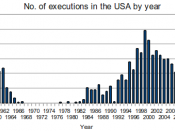"Excessive bail shall not be required, nor excessive fines imposed, nor cruel and unusual punishments inflicted," thus reads the Eighth Amendment to the Constitution of the United States. The term "cruel and unusual" first appeared in the English Bill of Rights of 1689. The American draftsman who adopted the English phrasing for the Eighth Amendment were primarily concerned with proscribing tortures and other barbarous methods of punishment. For example, the medieval punishment of cutting off the hands of thieves seems to qualify as cruel and unusual punishment. Capital Punishment has been part of the criminal justice system since the earliest of times. The Babylonian Hammurabi Code (ca. 1700 B.C.) decreed death for crimes as minor as the fraudulent sale of beer. Egyptians could be put to death for disclosing the location of sacred burial sites.
Clearly the death penalty in the United States has been a controversial issue since the beginning of the Republic.
Its early major opponents were the Quakers who based their opposition on humanitarian and practical factors. While the practice of capital punishment has long been a part of our civilization, in the 1970's it came under close scrutiny by the Supreme Court of the United States and it has remained an issue ever since. In 1972, the court struck down existing capital punishment statutes on the grounds that they were in violation of the 14th and 8th Amendments, which happens in the case of, Furman v. Georgia. But in the landmark decision, Gregg v. Georgia in 1976, many states modeled their statutes to conform to constitutional standards. In this case, the United States Supreme Court ruled that the death penalty does not violate the Eighth Amendment, provided that there are safeguards against any arbitrary or capricious imposition by juries. The majority opinion reads, "the requirement...


